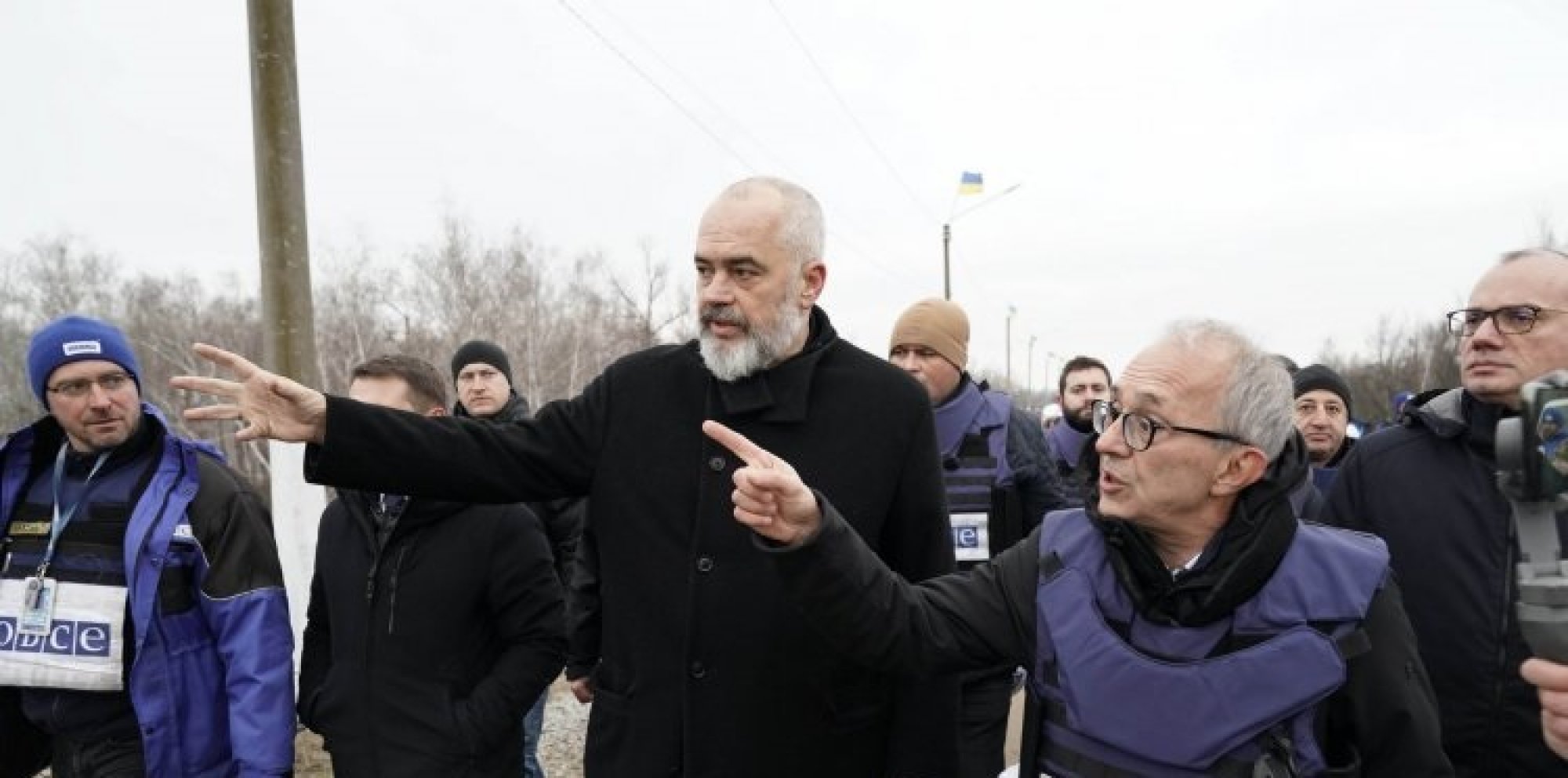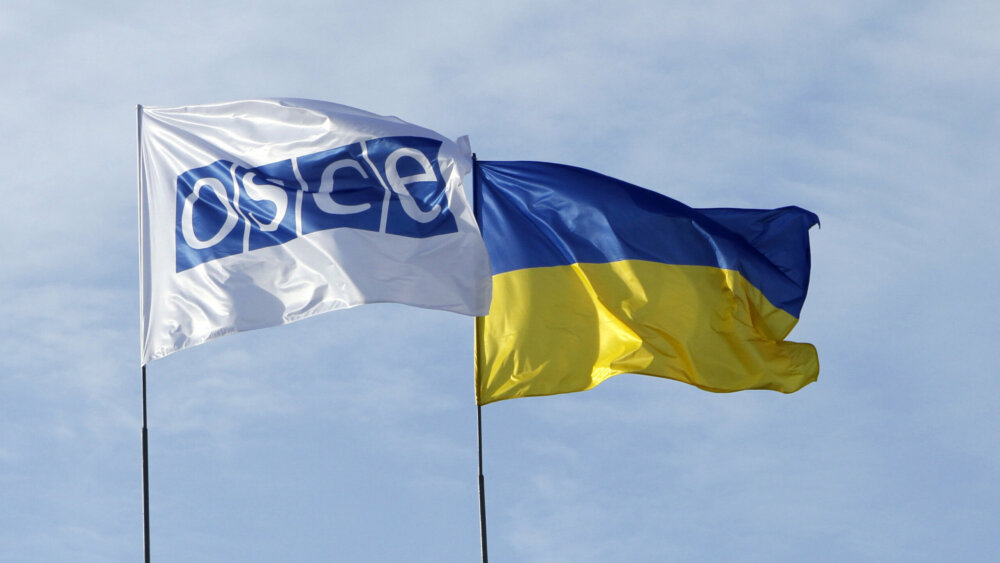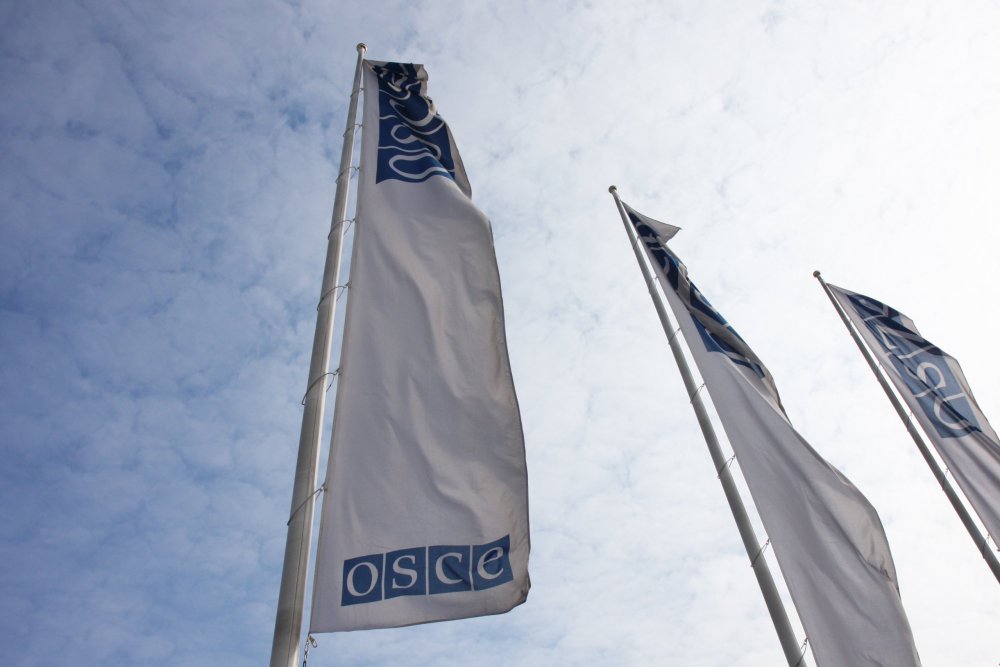OSCE/Evgeniy Maloletka

Albanian OSCE Chairmanship: Historic Opportunity with Pitfalls
Albania took over the annual OSCE Chairmanship from Slovakia on 1 January for a period of twelve months. Under the motto “implementing our commitments together” Albania’s work programme includes reducing tensions in eastern Ukraine, advancing conflict resolution efforts, strengthening the role of women in peace and security efforts, fighting corruption, combating trafficking in human beings, and advancing measures to tackle anti-Semitism, among other things.
Albania (with encouragement from Italy) stepped in as a candidate to chair the OSCE in 2020 after Norway unexpectedly withdrew its candidacy back in 2017. It is only the second time that a Balkan nation has taken over the helm of the Organization, with Serbia having chaired the OSCE in 2015.
“This is a historic task, as it is the first time that Albania has a role on the international stage,” Edi Rama, Prime Minister and Foreign Minister of Albania, said in Vienna on 9 January, presenting his country’s priorities to the OSCE Permanent Council.
Rama went even further and said that taking over the OSCE Chairmanship was an “amazing moment” for Albania, particularly given the fact that Albania was the only European country that refused to become part of the Conference on Security and Cooperation in Europe (CSCE) in the 1970s, and at the time even denounced its creation as “a clear example of the deepening moral degeneration of its members”. Back then, Albania was “stubbornly isolated” and “fuelled by hatred against the free world”, as Rama described it.
Indeed, it was only in 1991 that Albania eventually joined the CSCE, thus marking a dramatic departure from four and a half decades of self-isolation under communist rule.
Presiding over the OSCE will be a balancing act for Albania, but could also provide the country with increased international visibility and an opportunity to push for the reopening of EU accession talks.
This is ever more important for Albania, particularly against the background of France blocking Albania’s EU accession ambitions in autumn last year. At the time, there was great disappointment and frustration in Tirana because EU membership is widely supported in Albania’s political and business communities. Many hope that joining the bloc could help cut unemployment and lead to comprehensive and long-lasting reforms in the country.
In that respect, chairing the OSCE could help Albania demonstrate that it is a reliable international partner, showcase its diplomatic skills, and thus increase its chances for the opening of possible EU accession talks (maybe already at the end of March).
Yet, using the stage and visibility of the OSCE Chairmanship successfully will depend largely on whether Albania will be able to manage the polarized and volatile domestic political situation, and also the unresolved Kosovo question.
In addition, the fact that Edi Rama is both Prime Minister and Foreign Minister has both advantages and disadvantages. On the one hand, his stature brings with it a certain gravitas which helps to raise the profile of both his country and the OSCE when he has meetings abroad. On the other hand, being a high-profile figure at a time of political instability within his own country brings with it certain risks.
Large-scale, anti-government protests began in February 2019 against the socialist government of Edi Rama, which is being accused of election fraud and corruption. In the latest developments, on 2 March, thousands of protestors gathered in Tirana to protest against the government, responding to a call from the country’s president, who accuses the government of violating the constitution because of a dispute around the nomination of vacant seats in the Constitutional Court.
Experience from past OSCE Chairmanships (for example Ukraine) shows that instability at home makes it more difficult for the Chairperson-in-Office (CiO), in this case Edi Rama, to take on his full OSCE-related responsibilities. Because, in many cases, the personal engagement of the CiO is needed to solve disputes among OSCE participating States, and to achieve consensus in the OSCE. Much will therefore depend on how the domestic situation in Albania will develop in the next few months.
Furthermore, Albania’s stance on the still unresolved question of Kosovo is looming large on the horizon. Albania, which shares strong cultural and linguistic ties with Kosovo, was one of the first countries to officially recognize Kosovo after its declaration of independence in 2008. (Over 100 countries have thus far recognized Kosovo’s independence.) Negotiations between Kosovo and Serbia remain ongoing to find a final solution to the question, with Kosovo being a former Serbian province.
Some diplomats in Vienna are now asking – off the record – what all of this could mean for negotiations on the breakaway regions in the OSCE region, including Transdniestria and Nagorno-Karabakh. In this context, diplomats are also closely watching upcoming presidential and parliamentary elections in Nagorno-Karabakh, scheduled to take place on 31 March, and how the Albanian Chairmanship will handle them. As one source remarked: “The Albanian Chairmanship will be well-advised to leave official statements on the elections to the Co-Chairs of the Minsk Group.”
That said, the Albanian Chairmanship started on a wave of support. Firstly, the fact that it expressed its willingness to chair the OSCE at a time when no other country was interested, saved the Organization from a leadership crisis. Secondly, there has been strong solidarity and support for Albania after the devastating earthquake of 26 November 2019. Thirdly, the Chairmanship has put together a good team, particularly in Vienna.
Like his recent predecessors, the new CiO has started the Chairmanship by focusing on the most acute crisis in the OSCE area, namely the situation in eastern Ukraine. On 20-21 January, he visited Kyiv and held talks with Ukraine’s President Volodymyr Zelensky, Prime Minister Oleksiy Honcharuk, Foreign Minister Vadym Prystaiko, and Speaker of the Parliament Dmytro Razumkov. Rama also visited eastern Ukraine, particularly the area around the recently repaired and reopened Stanitsya Luhanska bridge.
“Contributing to a peaceful resolution is an utmost priority of the Albanian OSCE Chairmanship in 2020. That is why I wanted to start my official visits with Ukraine, within my first month in the role,” Rama said.
Placing a strong focus on Ukraine will be important because despite some recent positive developments in eastern Ukraine, the ceasefire is still being broken, and, all in all, 14,000 people have perished in the conflict since 2014. Also, the next Normandy Format meeting between the leaders of France, Germany, Russia and Ukraine, originally scheduled to be held in Berlin in April, is now apparently in jeopardy.
Apart from a visit to Ukraine, Rama also delivered the traditional speech at the UN Security Council in New York, and held talks with NATO Secretary General Jens Stoltenberg in Brussels in January.
Furthermore, in his capacity as OSCE CiO, Rama visited Washington on 5 February, as well as Moscow on 26 February, meeting with his counterparts U.S. Secretary of State Mike Pompeo, and Russian Foreign Minister Sergey Lavorv. Additional Chairmanship trips to the South Caucasus and Central Asia are planned for the near future.
High-level political talks aside, in the next few weeks the most immediate challenges to tackle will be on a more organizational level among OSCE diplomats in Vienna. And here the Albanian Chairmanship will play a crucial role in helping OSCE participating States reach consensus.
First, there is still no consensus on the annual OSCE unified budget for 2020. Lengthy and protracted negotiations have become the new norm in recent years. The longer they take, the more likely they will hamper the normal functioning of the OSCE. Salaries have to be paid and long-planned projects have to be implemented. On top of this, OSCE participating States are still fighting over the so-called Scales of Contribution, that define how much each of the 57 participating States annually pay for the OSCE.
Secondly, OSCE participating States are currently negotiating a 10% increase in the budget of the OSCE Special Monitoring Mission to Ukraine (SMM), which is separate from the annual core budget. In real terms, this would mean an increase in approximately 10 million Euros for the SMM. The need to expand the capacities of the OSCE SMM was first noted by the Normandy Four Leaders during their meeting in Paris on 9 December 2019. They consider an upgrade of the mission’s human and technical capabilities necessary in order to move to 24/7 monitoring, including during the night.
The approval of the next SMM budget goes hand in hand with the extension of the mandate of the SMM, which expires on 31 March. With the SMM being the flagship operation of the OSCE, the Albanian Chairmanship is therefore under immense pressure to forge the necessary consensus on this urgent issue, so that the SMM can continue its important work in eastern Ukraine, ideally with more money.
Thirdly, the Albanian Chairmanship will be busy brokering consensus on the prolongation of the four most important leadership posts in the OSCE before 30 June. They concern the OSCE Secretary General, the Director of the OSCE Office for Democratic Institutions and Human Rights (ODIHR), the OSCE High Commissioner on National Minorities (HCNM), and the OSCE Representative on Freedom of the Media (RFoM). All posts are essential so that the OSCE can function normally.
Finally, in accordance with OSCE regulations regarding 4-year term limits, seven OSCE Heads of Mission are due to be replaced in 2020. Three in South-Eastern Europe (including Albania), and four in Central Asia.
The next few months will be a big test for Albania’s diplomatic skills. In a difficult political environment, success is often measured as the absence of failure. If Albania can steer the OSCE through the next few months and broker consensus on the key budget and appointment issues, it will have overcome major hurdles by the summer recess. In the process, it will be worth reminding participating States of the need to “implement commitments together”. After all, issues like the budget, scales and senior appointments are a shared responsibility, not only the Chair’s problem.
In short, Albania’s Chairmanship of the OSCE in 2020 is an historic opportunity for the country, but with potential pitfalls.



Comments
* Your email address will not be published